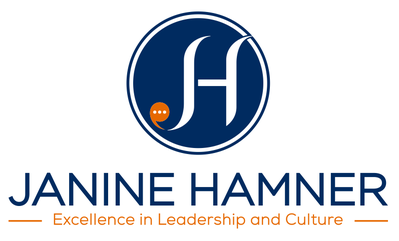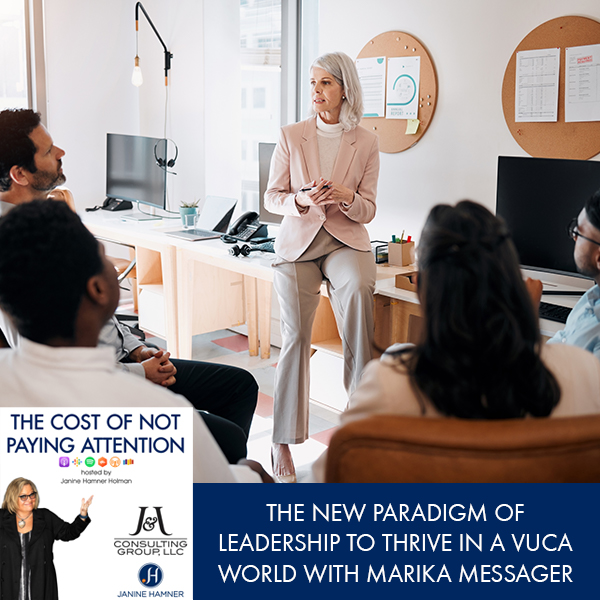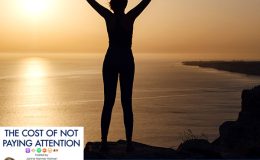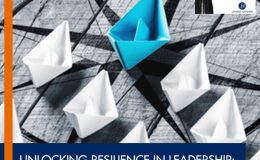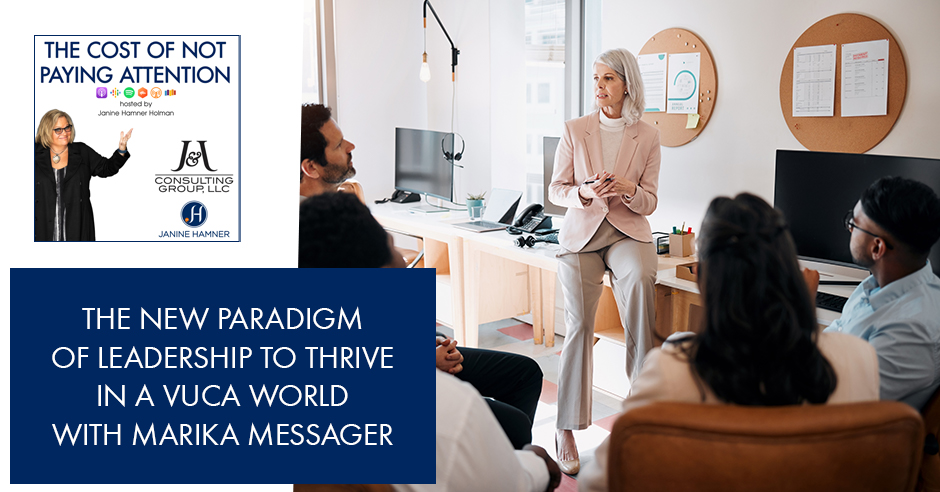
Feeling stuck and unfulfilled? The world of work has drastically changed, leaving many feeling burnt out and questioning their purpose. Join leadership expert Janine Hamner Holman as she chats with Marika Messager, founder of ConsciousLeadership.org, about the hidden costs of not paying attention to these global shifts. Discover how to navigate this “VUCA” world (volatile, uncertain, complex, and ambiguous) and build resilience for yourself and your organization. Operate in the new work landscape. Get ready to be inspired and empowered to create a more positive and impactful future!
GUEST: Marika Messager | LinkedIn, Facebook, and Instagram | Visit their Website: ConsciousLeadership.org
HOST: Janine Hamner Holman | Janine@JandJCG.com | LinkedIn, Facebook, and Instagram| Subscribe to my Newsletter! | Book me to Speak!
Listen to the podcast here
I am so excited to have our guest with us today. Marika Messanger is a conscious leader, a visionary, a teacher, and a researcher in consciousness. She does a lot with elevating individuals, businesses, and the global community into a new paradigm of positive and purposeful impact. Welcome to the show, Marika.
Thank you, Janine. Very happy to be with you today.
VUCA World
Fantastic. All right, well, let’s get into it. What is one thing that you have noticed ,either with a team at conscious leadership or with your client, what’s one thing that they have been failing to pay attention to? What’s the cause of that in attention? What’s the problem that inattention is causing?
Yeah. I would say that for organizations, what I’m observing globally and with all types of organizations, the one thing that is really holding organizations back and really costing organizations, profit, fulfillment, purpose, and impact is the lack of awareness that the world we live in and the organizational world, in general, has drastically changed. We live in a “VUCA” world which is “volatile, uncertain, complex, and ambiguous.”
That means that the way we work, the way we be has to change in order for us to adapt to this new world. The failure to recognize that and holding on to the old way is not only costing innovation and creation, but it’s also costing individual fulfillment and ultimately profit and performance. If we go deeper, the cost of that really is burnout, disengagement, and inappropriate diversity and inclusion practices. I mean, the list is very long.
The list is very long. I heard the CEO of Korn Ferry maybe about two weeks ago say that in the last four years, we have undergone more change than any of us alive have seen in our lifetime. I’ve been doing a fair amount of keynote speaking recently on resilience and have been using that line.
When I say that, and I encourage people to close their eyes and let that sink in and that’s what I see happening in audiences. When I say that, they’re like, “Oh my goodness,” because in part it explains why people are feeling like they’re running as fast as they can and they aren’t catching up. Why we’re dealing with a sort of international epidemic of burnout. Why rates of depression and anxiety are increasing.
It explains a lot of things. People also are feeling, “If that’s what the last four years have been like, what does that mean for the future?” Because our brain has a very hard time, of course, as you know, being in the present. Our brain is always either going into the future or going into the past, neither of which tends to do us a lot of good. When you think about that and the change that you were just speaking to that we are experiencing, what are some of the sort of key hallmarks of that as you think about it?
Individual, Organizational, And Systemic
Well, first I would agree with what you just said. There are different dimensions that we need to look at. There is the individual dimension, there is the organizational dimension, and there is the systemic dimension. Clearly, the pandemic has triggered a lot of unconscious material coming out and being triggered, right? As individuals, we’ve been challenged, we’ve been taken out of our comfort zone, we’ve been taken out of our known environment.
At the individual level, a lot of us have been forced to be with ourselves much more than we have been used to, right? For a lot of us, it was happening without having the tools to be with ourselves, having the tools to do that in a word. That has created a lot of chaos and sometimes despair, desperation, and burnout or depression, just because we haven’t been used to be connected with ourselves. All those external distractions have been taken away so that we look inward.

At the individual level, we have to see the pandemic as a gift of reconnecting with ourselves so that we get to know ourselves better and level up our emotional intelligence.
This is the first thing to acknowledge. Once this has been triggered, there is no way back as much as at the individual organizational and systemic level again. My belief is that at the individual level, we have to embrace that, we have to see that as a gift of in reconnection with ourselves so that we get to know ourselves better from a self-awareness perspective so that we level up our emotional intelligence, so that we understand our emotions better, the way we can process them, our emotional agility, and also find more meaning in what we do.
There’s also been a meeting crisis where a lot of people have been asking themselves, “Why am I doing this?” For a lot of people as well, there’s been a forced redefinition of what success looks like. This kind of rude awakening of, “It’s not what I’ve been told it is.” Or, “I’m ticking all the boxes, but I’m not fulfilled. I’m not happy.” There are some deeper layers of questioning that have been triggered that we either have a choice to embrace that self-reflection or to run away from it.
What I’ve been observing is that the people who have been daring to embrace that process are the ones kind of coming out on the good side of this drastic change and the ones that are denying it are the ones who are suffering the most. That can mean addictions, depression, and even more distorted ways of behaving. That’s the first thing. Then at the organizational level, I mean, there is no denying today that the world of organization, the world of business is in chaos.
The way we used to operate doesn’t operate anymore, and there are some very tangible elements such as remote work, for instance. In the beginning, most people were thrilled to be able to work from home, and then they recognized that that came with challenges and the necessity to have discipline, to have some boundaries, to find a connection in a different way, and to build collaboration in a different way.
Now, we can see some organizations, I mean, most of them none of them have cracked the way to do hybrid work. We can see some of them trying to force individuals back to work, some of them being more flexible, but that comes with a lot of challenges. It’s this understanding that we need to create new ways and we need to adapt to this ever-changing environment with new practices.
I would say really at the organizational level, for me, there is a deep need to recognize that as an organization, we need to support our employees. Like employee satisfaction, employee well-being is becoming for me like a key to actual performance and profit. Let’s put it this way. We see that 80% of employees are disengaged.
There is a deep need to recognize that as an organization, we need to support our employees. Share on XWe see that, for instance, 70% of knowledge workers have experienced burnout in the last 12 months. We can’t deny that there is something going on and that as a conscious organization, it is our responsibility and also our purpose to bring about those new ways so that we also incubate systemic change. To be fair, all the issues that we can see in organizations today are issues that we can also see in the collective and in the system.
A New Paradigm Of Leadership
Absolutely. There are so many things in there that were brilliant nuggets, and I’d like to unpack some of them a little bit. Before I get to that, our listeners may have noticed that you have a lovely lilting accent. Where are you originally from?
I’m French. I was born and grew up in Paris. Now, I’m living in London and it’s been 17 years, but as you can hear, my accent doesn’t go away.
One of the things that sometimes happens is we fall into myopic thinking and we think, well, this is only happening in my organization or this is only happening in organizations in California where I am or in London where you are. Part of what I love about this conversation is your clients, correct me if I’m wrong, but I would imagine that your clients are mostly in Europe. Is that correct?
They are quite international. I have clients in the U.S. I have clients in South America. I have of course a lot of clients in Europe. Asia is probably the area that I covered the least, but it’s quite international, yeah.
I love that because it gets us out of thinking, well, for me, this is just something that’s happening in the U.S. This isn’t something that’s happening in other places and your experience is this is a global phenomenon. It gives us the opportunity to think larger about it and to realize that this is not something that’s just happening in my organization. This is not something that’s just happening to me. This is something that is happening around the world.
It then gets us more into that systemic thinking that you’re talking about. I loved the phrase, there is “a mission crisis,” and part of what I love about that is I do a lot of work helping organizations grapple with mission, vision, and values as the core of how they work on psychological safety. How do they work then on emotional intelligence? How do they work then on diversity, equity, inclusion, and belonging?
Whatever the other initiatives are that they’re interested in doing something about, I always ground it in mission, vision, and values. I do that for two reasons. One is because if something is grounded in your mission in your vision and in your values, you’re going to be able to allocate resources to it and the only resources that we have are time, energy, and money. If it’s connected to what you’re about as an organization, it’s going to be easier to ensure that those resources get allocated.
The other reason that I do it is because, as I know that you know, there is this mission crisis. There is this meaning crisis. There is this need, it shows up most exaggeratedly is not really the right word, but in a way more in the forefront with the younger generations, with the millennials and the Gen Zs in the workforce.
They are very mission-driven.
What is it that our organization is about and how is that making the world a better place and how does my work connect to that? If we tell the truth, that’s what I’ve always been looking for. I talked to a woman who worked for a whole series of businesses of financial businesses on Wall Street for 25 years in senior positions and what she was always looking for was meaning, mission, and how does this connects to what’s important to me. How do you see that playing out in the organizations that you have an opportunity to work with?
First, let me say that I would like to thank you in finance for 14 years. I was on the trading floor and at the end of my career in the financial industry, I was head of equities for the French Bank for Europe and the Middle East. I was managing 50 people. That experience, as much as I loved it, and it was extremely fulfilling in terms of intellectual stimulation and there I say adrenaline, gave me the experience to observe distorted patterns of behavior, but to have the ability to see them for a systemic program rather than an individual distortion.
Clearly in those big institutions, the why we do things is unclear. I’ve worked with a lot of clients in the financial industry, obviously, because it’s such a specific industry that when you know it from the inside, you have a great edge to it. There is clearly in those specific industries, a longing for meaning. You’re completely right these days, especially the younger generations, that’s what they want. Why am I doing this? What’s the purpose?
I think it’s fantastic because it’s forcing organizations of all sizes, and especially the big ones too, to ask themselves that question and to be clear because we know that suffering comes from lack of alignment. If I don’t know the vision, mission, and values of my organization, clearly, how can I know if I’m going to be aligned with them? If I cannot make that reconnection, that connection, most likely there will be some lack of alignment and most likely that will trigger some suffering. For the first time in the world of organizations, we have five generations working together.

Suffering comes from lack of alignment. If you don’t know the vision, mission, and values of the organizations clearly, how can you know if you’re going to be aligned with them?
That’s right.
This is a challenge and this is a fantastic opportunity because it forces us to include and to have that inclusion mindset and to really understand each generation and what have they been programmed with. What are their needs? What are their wants? What are their fears? To integrate all those elements and to find ways to work together that fulfill each generation, that bring the best of each generation, one thing that I work a lot with organization is resilience.
It’s very interesting when we talk about those five generations from the angle of resilience because one thing I’ve observed is that those young leaders, they don’t want to be like us. Right or wrong, we can’t blame them, right? They don’t want to be like us and it means that the transference of wisdom and experience is much harder because there is resistance.
At the same time, we have been through a lot of cycles, a lot of difficulties, and a lot of kind of systemic chaos that has given us a lot of resilience and a lot of wisdom, there I say, have to share. We have that responsibility to share. I found that resilience is a great bridge because young leaders do recognize that they are not as resilient as the older, myself included, as the older generation. It’s a really fantastic bridge to open the lines of communication so that they can learn from us.
At the same time, I always ask every business I work with, is there a way to create a way of working that gives resilience to people. We want people to become more resilient, but can we also create organizations that support and give resilience to individuals? This is creating systemic and collective conversations, which is what we need really to bring about a new paradigm of leadership, of employees, of business, and to create that bridge between all of us.
I love that, and I love it that you’re focusing on resilience is one of the things that I focus on too, in part for exactly that reason. In part, I focus on it because we are in this place where we need some resilience! We need to learn some new tools. We need to create some new habits. I love the word resilience. I have a resistance to the word grit, even though there’s a wonderful book by the brilliant Angela Duckworth called Grit, which I certainly appreciate.
Grit for me feels very much like toughing it out. For me, resilience is an acknowledgment of the fact that we get knocked down and we then get to get back up. Resilience for me is ultimately all about recovery. How do we get back up? How do we get back up stronger and better? How do we move forward through the challenges? Because we all know, even though we like living at 72 degrees, it’s very comfortable, that’s not when we grow.
Some of us may have had a little too much growth recently!
We might like things to slow down, but unfortunately, that’s actually not the way that things are going. If we feel like time is speeding up, it is because the pace of change is accelerating. Then really the question is, how do we build in both individual and organizational resilience in order to weather these changes and in order to not only bounce back, but bounce forward? I too have been sort of using that as a bridge, as you call it, and have found it to be very successful. Have you found that organizations and individuals are equally connecting to that theme of resilience?
Well, yeah, for sure. I think at the individual level, there is clearly an awareness that we need to be more resilient just simply because the world is asking us to be more resilient, not only professionally, but also personally and socially and that’s there and at the organizational level as well. I mean, I always laugh because I’m 48 and as younger we used to do some like 12 months business plan.
We need to be more resilient simply because the world is asking us to be more resilient. Share on XThere is no such thing as a 12-month business plan anymore. Things change every three months, or sometimes on a monthly basis, we have to pivot, we have to adapt, we have to redirect and that requires resilience. Definitely, the awareness is there. How do we increase level up and help people grow into being more resilient is clearly a theme and something that I believe every organization should ask themselves a lot. I mean, I know a lot who do, but there is no denial of this anymore.
It’s not nice to have. It’s a must-have to really support your organization to be more resilient. For instance, every organization this day, every business has a tech project, which adds more pressure and there is, as you were saying, that sense of it has to happen now. There was this fast space dimension, which again is adding pressure. The more pressure there is, the more resilience we need. It’s clearly there.
Get In Touch With Marika
If people are listening to us and they are thinking, “This sounds important.” I was about to say, “This sounds good.” It may not sound good, but it may sound important. How can they get in touch with you? What’s the easiest way?
The easiest way is to go to our website, ConsciousLeadership.org, and there is a contact form. You can get in touch. I’m always happy to have conversations around how to bring Conscious Leadership into your organization. You can also follow me on LinkedIn and Instagram @MariKaMessager, where we share some valuable content. On the website, there are loads of complementary resources and I’m a researcher at heart so we have a monthly digest why discuss topics around equity, inclusion, and the world that is changing the paradigms that we really want to get into. This is a great way to follow us. Again, always happy to have some conversations.
Wonderful, and we will have all of those links in the show notes. Go check those out to get in touch with Marika. This has been such a wonderful conversation. Is there anything that you were hoping that we might touch upon today that we haven’t yet had an opportunity to chat about?
Yeah maybe. I always like to elevate the conversation to the responsibility that we have individually, as an organization, and as a system as well. For me, this is a true conscious leader is someone who takes responsibility for themselves, but also who takes responsibility for the impact that they have, the negative, and the positive.

A true conscious leader is someone who takes responsibility for themselves and for the impact that they have, both the negative and the positive.
I would really encourage everyone, every CEO, every individual, and every employee to question themselves and really have this reflection around how can I take full responsibility for what I’m creating for myself, what I’m creating for my employees, what I’m creating for my organization because we have the power to make an impact. It’s only as we take full responsibility for that we can start to see changes.
I love that and I love your focus on conscious leadership as our listeners, longtime listeners know, I wrote a book last year about conscious leadership and so I love that you and I have so many things in common and I love that that is yet another one of them. Marika, thank you so much for sharing your insights, your wisdom, and your perspective from across the pond and from all of the years that you have spent studying and being in the trenches on all of this. It has truly been my honor to have you here with us today.
Well, thank you, Janine. It was a pleasure and it’s always great to share those conversations with people who are in that field and daring to make a difference.
Thank you. I am Janine Hamner-Holman and this has been the Cost of Not Paying Attention. Remember, great leaders make great teams. Until next time.
Important Links
- Marika – Website
- Grit
- ConsciousLeadership.org
- LinkedIn – Marika Messager
- Instagram – Marika Messager
- https://www.facebook.com/marikamessager
About Marika Messager
 Marika Messager is a Conscious Leader, visionary, teacher, researcher in consciousness, elevating individuals, businesses, and the global community into a new paradigm of positive and purposeful impact. Marika is the Founder of ConsciousLeadership.org: both a movement and a community; a way of bringing together global leaders to mobilize collective power for greater transformation. ConsciousLeadership.org exists to equip individuals with the systems and practices needed in order to create a conscious culture in businesses and the wider world. We teach, research and demonstrate what Conscious Leadership looks like on an individual, organizational and collective level.
Marika Messager is a Conscious Leader, visionary, teacher, researcher in consciousness, elevating individuals, businesses, and the global community into a new paradigm of positive and purposeful impact. Marika is the Founder of ConsciousLeadership.org: both a movement and a community; a way of bringing together global leaders to mobilize collective power for greater transformation. ConsciousLeadership.org exists to equip individuals with the systems and practices needed in order to create a conscious culture in businesses and the wider world. We teach, research and demonstrate what Conscious Leadership looks like on an individual, organizational and collective level.